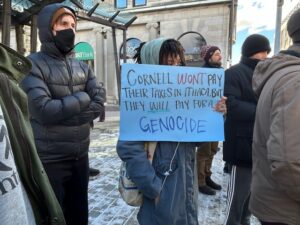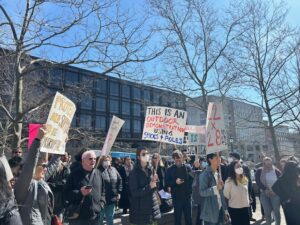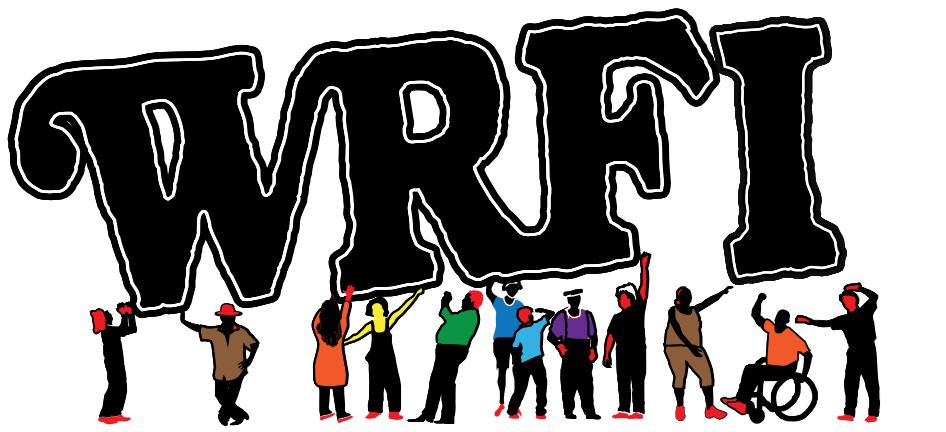LISTEN: Freedom of Expression at Cornell – Student views
The academic theme at Cornell this year is “Freedom of Expression.” A few weeks ago we reported on the general mood around free speech at Cornell. Today, we’re sharing students' opinions about their free speech rights.
WRFI asked to speak to someone in Cornell’s administration about free speech on campus. The request was denied.
The right to make offensive comments is probably the most challenging thing about defending free speech rights.
Maria Valdez is a Cornell junior. She was banned from campus and suspended in early January just as the semester was starting. Valdez reposted something on social media from a Palestinian journalist in Gaza and added her own comments. They included the words, “Zionists must die.” No one involved in her case says what she posted should happen. Not even Valdez.
"So I did not mean it literally. I think I was just making an emotional response. And it was like, followed like, like out of a frustration of like or double moral," she said.
At least two national free speech rights organizations are concerned by Valdez’s situation. Zach Greenberg is an attorney with FIRE, the Foundation for Individual Rights and Expression. He says Valdez has the right to make that post and not be punished. He says when it comes to this type of speech, intent matters.
"The speech here, posted on social media, not direct anyone in particular without any circumstances or context, indicating there was a serious intent to follow through with this act would remain protected by the free speech promises that Cornell makes to its students," said Greenberg.
Veronica Salama is an attorney with the New York Civil Liberties Union. It’s the state affiliate of the American Civil Liberties Union.
"There are a number of concerning aspects about this incident," Salama said.
Salama says one of those concerns is the public statement from University President Martha Pollack shortly after news of the post started to spread. Pollack stated that if the person who made the post was part of Cornell they would be punished.
Salama said that happened "prior to any investigation taking place into whether or not that statement violated any of the Code of Conduct, which we believe it didn't, it would not have violated any of the Code of Conduct. And it is extremely troubling and raises questions about the motivations in doing so and their purported commitments to free expression on their campus."
She says Cornell isn’t the only university taking an 'ask questions later' approach to punishment for certain types of student speech.
"Yes, we are definitely seeing this elsewhere, we are seeing universities jump in to, to discipline their students or to investigate them in ways that don't quite comply with their procedures," she said.
Valdez was doxxed. She had her address made public and she received death threats. She left Ithaca out of concern for her safety. As of our deadline, she hasn’t gotten a disciplinary hearing. She’s deleted her social media and LinkedIn accounts.

Jack, a Cornell senior at a pro-Palestinian and cease-fire rally in downtown Ithaca. (Celia Clarke/WRFI)
"There is a concern here that if private campuses decide that they could stifle political and academic discourse that they don't approve of, then schools are just not a safe haven anymore for debate for discussion for learning" said Salama.
At a pro-Palestinian rally in downtown Ithaca, I met Jack, a Cornell senior. They didn’t want to give their full name out of concern about doxxing and university disciplinary actions. This happened frequently while reporting for this series. Jack questions what the academic theme, freedom of expression is really about.
"I guess I didn't really believe it in general, because Cornell is, like, a very elite institution that is known for like upholding systems of oppression. So the idea of freedom of expression in general just means – expression for who? It makes you question like, who is allowed to be free to express themselves and I know that that freedom does not extend to all students on campus," they said.
In January, the administration introduced an Interim Expressive Activity Policy. It’s gotten broad criticism from faculty, students, and staff. Jack says it’s having a chilling effect on students expressing their opinions.
"Again, just that fear of like, ‘Oh, if I come to a rally, I'll have my ID taken and something will happen to me.’ So even if they aren't like, implementing, like direct consequences to these policies, they are still like put in place for one to scare us and then to have people like, fearing, wanting to speak of up," they said.

A protest against the Interim Expressive Activity Policy in front of Day Hall, Cornell campus, Ithaca, NY. (Celia Clarke/WRFI)
Jack is part of a divestment movement on campus. A coalition of groups pressuring the university to cut ties with companies they say support genocide in Gaza.
It’s not just people on the political left who believe Cornell upholds a status quo.
Olivia Corn graduated from Cornell in 2019. She was president of the Cornell Republicans, a student political organization.
"Cornell very liberal, and anything outside of that, or anything that deviated from that standard, no one wanted to talk about.
Corn wants to be sure people know what she thinks of Donald Trump.
"I have never supported him, I think he's awful," she said.
Her view of Cornell as liberal is based on her experience with the Cornell Republicans. They brought several speakers to campus following the election of Donald Trump. She said when students heckled speakers until they left the stage without giving their talks no one faced university disciplinary actions.
WRFI requested interviews with current members of the Cornell Republicans. We didn’t get a response.
"Nobody cared in 2016. No one cared that someone was attacking a conservative speaker, it didn't rise to the level that wasn't a big deal. It wasn't going viral. No one's job was on the line," Corn said.
Corn said Pollack and other leaders didn’t issue public statements or offer her support."
They did not stand behind us strongly enough at all. And I did feel during the first event that I was very strongly on my own. And as a 19-year-old student getting death threats. I shouldn't feel like the school doesn't have my back," she said.
Opponents of the interim policy are especially critical of its ban on candlelight, limitations on the size of signs and having them on poles, restrictions on when and where amplified sound can be used, and vague language about registering events with 50 or more people. The administration updated the policy on March 11. It removed some of these clauses but not all. That same week about 10 students faced disciplinary hearings based on parts of the interim policy.
Corn said the interim policy doesn’t do anything to change what she considers an overall campus climate of intolerance to unpopular views.
"I have no issue with the people who are outside the events, protesting. I think those people have every right to be there and I support those people. Being there. Be there. Be loud. Support your position. I have issues with the people who come into events and shout people down and the school has not addressed that problem," she said.
Corn, Valdez and the students I spoke to for this story all said that expressing their views, arguing or debating people who disagree with them, is part of what they want from their college experience. But current students say the interim policy has changed how they feel about expressing their opinions openly.
"I think staying within your own bubble and firmly adhering to your own opinion, is the worst way to grow as a human being because you don't learn anything," said Corn.
The administration has invited the controversial conservative pundit and Cornell graduate Ann Coulter to speak on campus. When she came to Cornell in 2022 she taunted and heckled when she began to speak. She left the stage without giving her speech. The Cornell Daily Sun says Coulter has “a long history of making bigoted remarks against minority groups including South Asians, Jews, Muslims and immigrants.” They report she is scheduled to speak on April 16.
